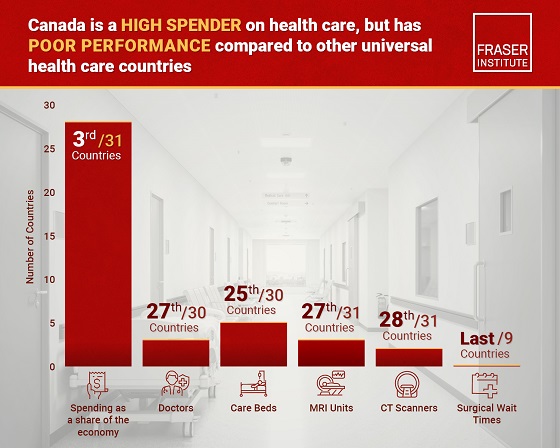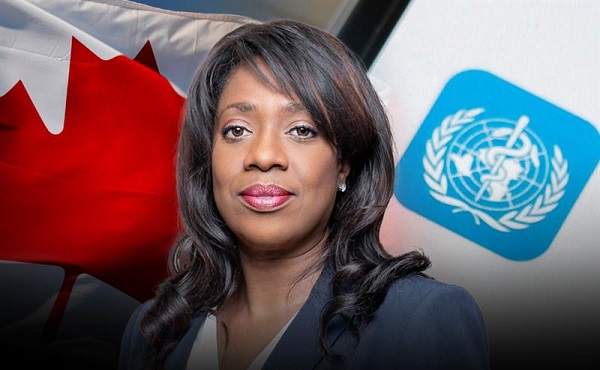Fraser Institute
Canadians want major health-care reform now

From the Fraser Institute
Tragic stories of multiyear waits for patients are now a Canadian news staple. Is it any wonder, therefore, that a new Navigator poll found almost two-thirds of Canadians experienced (either themselves or a family member) unreasonably long for access to health care. The poll also found that 73 per cent of respondents agree the system needs major reform.
This situation shouldn’t surprise anyone. Last year Canadians could expect a 27.7-week delay for non-emergency treatment. Nearly half this time (13.1 weeks) was spent waiting for treatment after seeing a specialist—that’s more than one month longer than what physicians considered reasonable.
And it’s not as though these unreasonable waits are simple inconveniences for patients; they can have serious consequences including continued pain, psychological distress and disability. For many, there are also economic consequences for waiting due to lost productivity or wages (due to difficulty or inability to work) or for Canadians who pay for care in another country.
Canadians are also experiencing longer delays than their European and Australian universal health-care peers. In 2020, Canadians were the least likely (62 per cent) to report receiving non-emergency surgical treatment in under four weeks compared to Germans (99 per cent) and Australians (72 per cent).
What do they do differently? Put simply, they approach universal care in a different way than we do.
In particular, these countries all have a sizeable and well-integrated private sector that helps deliver universal care including surgical care. For example, in 2021, 45 per cent of hospitals in Germany (a plurality) were private for-profit. And 99 per cent of German hospital beds are accessible to those covered under the country’s mandatory insurance scheme. In Australia, governments regularly contract with private hospitals to provide surgical care, with private facilities handling 41 per cent of all hospital services in 2021/22.
These universal health-care countries also tend to fund their hospitals differently.
Governments in Canada primarily fund hospitals through “global budgets.” With a fixed budget set at the beginning of the year, this funding method is unconnected to the level of services provided. Consequently, patients are treated as costs to be minimized.
In contrast, hospitals in most European countries and Australia are funded on the basis of their activity. As a result, because they are paid for services they actually deliver, hospitals are incentivized to provide higher volumes of care.
The data are clear. Canadian patients are frustrated with their health-care system and have an appetite for change. We stand to learn from other countries who maintain their universal coverage while delivering health care faster than in Canada.
Author:
Energy
National media energy attacks: Bureau chiefs or three major Canadian newspapers woefully misinformed about pipelines

From the Fraser Institute
These three allegedly well informed national opinion-shapers are incredibly ignorant of national energy realities.
In a recent episode of CPAC PrimeTime Politics, three bureau chiefs from three major Canadian newspapers discussed the fracas between Alberta Premier Danielle Smith and Prime Minister Mark Carney. The Smith government plans to submit a proposal to Ottawa to build an oil pipeline from Alberta to British Columbia’s north coast. The episode underscored the profound disconnect between these major journalistic gatekeepers and the realities of energy policy in Canada.
First out of the gate, the Globe and Mail’s Robert Fife made the (false) argument that we already have the Trans Mountain pipeline expansion (TMX), which is only running at 70 per cent, so we don’t need additional pipelines. This variant of the “no market case” argument misunderstands both the economics of running pipelines and the reality of how much oilsands production can increase to supply foreign markets if—and only if—there’s a way to get it there.
In reality, since the TMX expansion entered service, about 80 per cent of the system’s capacity is reserved for long-term contracts by committed shippers, and the rest is available on a monthly basis for spot shippers who pay higher rates due largely to government-imposed costs of construction. From June 2024 to June 2025, committed capacity was fully utilized each month, averaging 99 per cent utilization. Simply put, TMX is essentially fully subscribed and flowing at a high percentage of its physical capacity.
And the idea that we don’t need additional capacity is also silly. According to S&P Global, Canadian oilsands production will reach a record annual average production of 3.5 million barrels per day (b/d), and by 2030 could top 3.9 million b/d (that’s 500,000 b/d higher than 2024). Without pipeline expansion, this growth may not happen. Alberta’s government, which is already coordinating with pipeline companies such as Enbridge, hopes to see oilsands production double in coming years.
Next, Mia Rabson, Ottawa deputy bureau chief of the Canadian Press, implied that Smith’s proposal is not viable because it comes from government, not the private sector. But Rabson neglected to say that it would be foolish for any company to prepare a very expensive project proposal in light of current massive regulatory legislative barriers (tanker ban off B.C. coast, oil and gas emission cap, etc.). Indeed, proposal costs can run into the billions.
Finally, Joel-Denis Bellavance, Ottawa bureau chief of La Presse, opined that a year ago “building a pipeline was not part of the national conversation.” Really? On what planet? How thick is the bubble around Quebec? Is it like bulletproof Perspex? This is a person helping shape Quebec opinion on pipelines in Western Canada, and if we take him at his word, he doesn’t know that pipelines and energy infrastructure have been on the agenda for quite some time now.
If these are the gatekeepers of Canadian news in central Canada, it’s no wonder that the citizenry seems so woefully uninformed about the need to build new pipelines, to move Alberta oil and gas to foreign markets beyond the United States, to strengthen Canada’s economy and to employ in many provinces people who don’t work in the media.
Business
Canada has fewer doctors, hospital beds, MRI machines—and longer wait times—than most other countries with universal health care

From the Fraser Institute
Despite a relatively high level of spending, Canada has significantly fewer doctors, hospital beds, MRI machines and CT scanners compared to other countries with universal health care, finds a new study released today by the Fraser Institute, an independent, non-partisan Canadian public policy think-tank.
“There’s a clear imbalance between the high cost of Canada’s health-care system and the actual care Canadians receive in return,” said Mackenzie Moir, senior policy
analyst at the Fraser Institute and author of Comparing Performance of Universal Health-Care Countries, 2025.
In 2023, the latest year of available comparable data, Canada spent more on health care (as a percentage of the economy/GDP, after adjusting for population age) than
most other high-income countries with universal health care (ranking 3rd out of 31 countries, which include the United Kingdom, Australia and the Netherlands).
And yet, Canada ranked 27th (of 30 countries) for the availability of doctors and 25th (of 30) for the availability of hospital beds.
In 2022, the latest year of diagnostic technology data, Canada ranked 27th (of 31 countries) for the availability of MRI machines and 28th (of 31) for CT scanners.
And in 2023, among the nine countries with universal health-care systems included in the Commonwealth Fund’s International Health Policy Survey, Canada ranked last for the percentage of patients able to make same- or next-day appointments when sick (22 per cent) and had the highest percentage of patients (58 per cent) who waited two months or more for non-emergency surgery. For comparison, the Netherlands had much higher rates of same- or next-day appointments (47 per cent) and much lower waits of two months or more for non-emergency surgery (20 per cent).
“To improve health care for Canadians, our policymakers should learn from other countries around the world with higher-performing universal health-care systems,”
said Nadeem Esmail, director of health policy at the Fraser Institute.
Comparing Performance of Universal Health Care Countries, 2025
- Of the 31 high-income universal health-care countries, Canada ranks among the highest spenders, but ranks poorly on both the availability of most resources and access to services.
- After adjustments for differences in the age of the population of these 31 countries, Canada ranked third highest for spending as a percentage of GDP in 2023 (the most recent year of comparable data).
- Across 13 indictors measured, the availability of medical resources and timely access to medical services in Canada was generally below that of the average OECD country.
- In 2023, Canada ranked 27th (of 30) for the relative availability of doctors and 25th (of 30) for hospital beds dedicated to physical care. In 2022, Canada ranked 27th (of 31) for the relative availability of Magnetic Resonance Im-aging (MRI) machines, and 28th (of 31) for CT scanners.
- Canada ranked last (or close to last) on three of four indicators of timeliness of care.
- Notably, among the nine countries for which comparable wait times measures are available, Canada ranked last for the percentage of patients reporting they were able to make a same- or next-day appointment when sick (22%).
- Canada also ranked eighth worst for the percentage of patients who waited more than one month to see a specialist (65%), and reported the highest percentage of patients (58%) who waited two months or more for non-emergency surgery.
- Clearly, there is an imbalance between what Canadians get in exchange for the money they spend on their health-care system.
Mackenzie Moir
Senior Policy Analyst, Fraser Institute
-

 Agriculture2 days ago
Agriculture2 days agoFrom Underdog to Top Broodmare
-

 Health2 days ago
Health2 days agoSovereignty at Stake: Why Parliament Must Review Treaties Before They’re Signed
-

 Business2 days ago
Business2 days ago$15B and No Guarantees? Stellantis Deal explained by former Conservative Shadow Minister of Innovation, Science and Technology
-

 RCMP2 days ago
RCMP2 days agoPolice arrest thieves using garage-door openers to access homes in Vanier, West Park, Anders Park, and Evergreen
-

 Bruce Dowbiggin2 days ago
Bruce Dowbiggin2 days agoWhile America Shrugs Off Woke, Canada Doubles Down On Feminizing Society
-

 Energy2 days ago
Energy2 days agoNational media energy attacks: Bureau chiefs or three major Canadian newspapers woefully misinformed about pipelines
-

 DEI1 day ago
DEI1 day agoConservative push to end Canada’s ‘anti-merit’ DEI programs receives support
-

 Alberta1 day ago
Alberta1 day agoPremier Smith moves to protect Alberta in International Agreements








